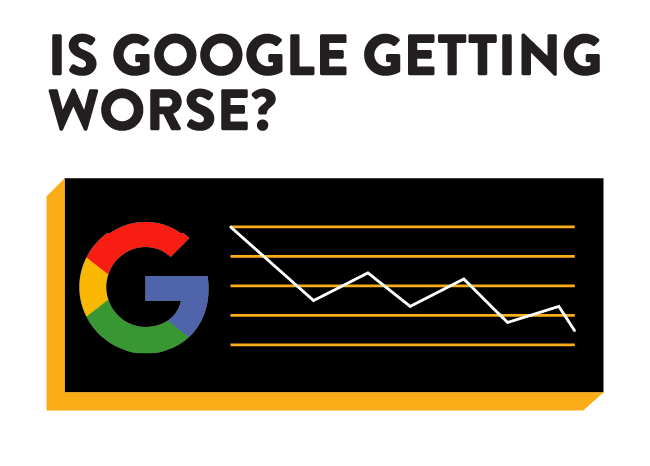
The search engine results page (SERP) never had a chance.
When it is your day or your query, struggling to find what you need can lead you to believe Google is getting worse. But to blame Google — at least, to blame only Google — is to miss the bigger picture.
Google isn’t a content generator. Nor, for that matter, is generative AI. Both are just sophisticated mirrors being held up to the web. If you don’t like what you see, don’t blame the mirror. Think about what it is reflecting.
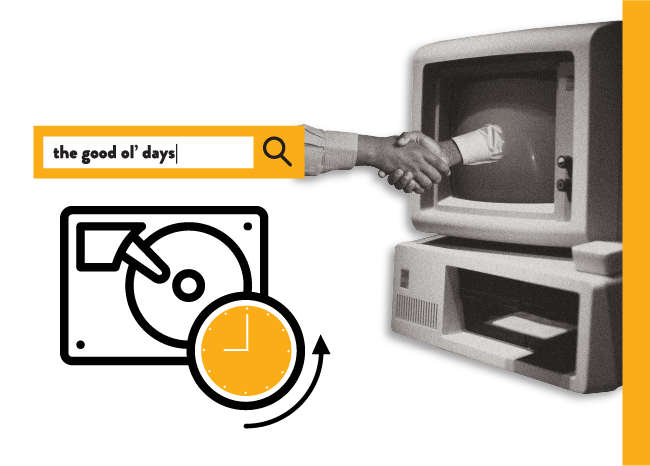
What Happened to Google Search?
Google’s a pretty good search engine. Critics with no tolerance for nuance declaim that Google is the worst search engine. That kind of hyperbole is pointless.
Google is actually very sophisticated and reliable, all things considered. But there are a lot of things to be considered, and for the average person on the web who just wants relevant info without delay or distraction, Google symbolizes everything wrong with online search. It still isn’t the worst search engine.
Google is a worse search engine than it used to be. It is hard to name a time when Google was in its prime — probably within a year or two of the Panda update rolling out (February 2011 and onward) and challenging notions of content quality on the web. That was a time when updates still made sense, were long-needed, and largely much-wanted.
Certainly, Google didn’t peak before its name was added to the dictionary as a synonym for seeking or obtaining information about (someone or something) on the World Wide Web (per The Oxford English Dictionary in June 2006 and then announced by Merriam-Webster in July 2006). The high point also can’t have been any time following the symbolism-drenched choice to walk away from their old, foundational motto, “Don’t be evil,” (first Alphabet, Google’s parent company, in 2015, then Google itself in 2018. This was followed by the feel-good lawsuit of the year in 2021).
That leaves roughly a four-year window in the 2010s when Google feasibly was the best search engine online — or if not, at least deserved consideration and had done plenty to establish its place as near-default for web-based search.
I’m writing late in 2023, so what happened?
If Google Search Is Useless, We All Helped Make It So
SERPs are often choked with spammy, hard-to-read, and plain garbage pages from scummy websites that fail to answer even questions for which we know there are answers. Sometimes, I’ve struggled to find a result that I already found once before — whatever combination of keywords I enter, I can’t seem to convince Google that the page I’m thinking of exists.
These irrelevant pages don’t come from nowhere.
The Top Results Reflect Expert Consensus (or Whatever Shows up Most Often)
The issues with Google’s algorithm often come down to garbage in, garbage out.
The folks at Google tend to be techy: programmers, developers, coders, machine learning engineers, and AI scientists. If Google were going to enforce any agenda in the SERPs, I would expect it to reflect the actual subject matter expertise they employ. But Google doesn’t create the vast majority of content it features in the SERP — it just finds it, and shares it on demand, when it seems relevant to a query.
So how does Google decide what is “right” or factually reliable, and what isn’t, when churning out billions of SERPs on countless topics every day? By comparing everything it finds on a topic, seeing where they agree, and where they disagree. Additionally, it assesses pages’ respective E-E-A-T indicators of credibility and historical track records for being viewed as credible.
In other words: Google assigns trust signals the same way you learn to trust or not trust people, or come to view them as experts or enthusiasts, but Google does so with fewer distracting social signals and cues that might sway your human emotions. Supposedly, Nazi scientist Joseph Goebbels once said of propaganda, “Repeat a lie often enough and it becomes the truth.” Just as repeated exposure to concepts, opinions, or data can start to make us trust, believe, or even assume the veracity of something, the frequency with which something appears on the web, along with the context and credibility of the sources, can convince Google of pretty much anything.
However, another popular — albeit misattributed — quote asserts, “All that is necessary for the triumph of evil is for good men to do nothing.” Here again, Google is a mirror to humanity, as any SERP you ask it for will come with a link at the bottom of the page inviting you to learn more about the results, Google’s operations, or even leave critical feedback. So, while lies can thrive on our unquestioning repetition and social sharing, the truth can also be defended by experts, users, and concerned citizens armed with compelling evidence.
We Expect Too Much of the SERPs
Disappointment often says more about expectations than reality. We expect relevance, but only in a completely self-centered way — while at the same time, griping about privacy and “owning” data we produce or which is produced to describe us. It turns out, relevance is also a deeply personal and situational thing.
The meanings of words and phrases change. Apple was a fruit until it was a computer company, and that means the SERP for “apple” is forever split between intentions. Google, like so many of us, has to contend with the fact that you can’t please everyone all the time. Yet that’s what we expect when we use Google: know what I really mean, based only on the words I use.
What relationship with these conditions wouldn’t go sour?
As Google’s programming and algorithmic considerations evolve and expand, so too does Google’s SERP change. It attempts to reflect the nuance of what “relevance” might be for any given word used by any given searcher. At the same time, SEOs (with varying levels of skill and a questionable shade of techniques) have been hard at work convincing Google to see their content as relevant, using everything they know about how Google works to strengthen their argument — at least on the surface.
The scale and complexity of the web and its semantic connections are effectively turning searchers into a divorce court judge ordering Google, a child, to choose whether to live with mommy or daddy.
It’s an impossible situation to satisfy, yet never fails to surprise people when they see something in the SERP they don’t immediately register as belonging there.
The web is where empathy goes to die and reanimate as a zombie; otherwise, we would react to SERPs by saying, “Oh, that’s not what I meant, but I can see how that would make sense for other people who search this,” instead of, “What’s wrong with Google? This isn’t what I was looking for. Google sucks!”
OK, but Seriously: Why Is Google So Bad Now?
Google is too big, complex, and closely tethered to the web for any one failure to explain everything.
That said, Google sucks because the web sucks. We all made it that way, because we, the people, suck.
Google Search Has Too Many Ads
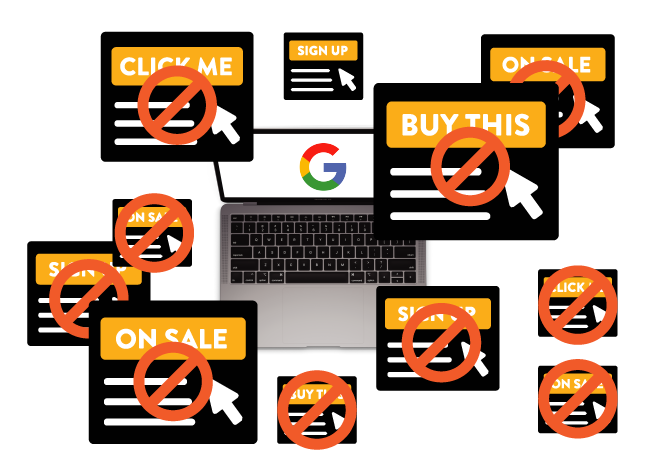
Yes. It really does. This has been true by the simplest measure: when Google started, it didn’t feature ads, and now it does. Lots. Since 2000, advertisers (or “sponsors” once upon a time) have had access to different means to pay Google for their own visibility. If an ad doesn’t perfectly match what you are looking for, it is a distraction and a bug, so Google was welcoming UX deficiencies from the moment it started incorporating paid results into the SERP.
But: we’re increasingly programmed to recognize and ignore ads when we see them — or even sense them. For all its efforts, Google still only induces some 6% of its searchers to click on its “Pay Per Click” ads. We may not like the ads. (I don’t. Google ads suck.) But few of us are clicking on them, and most of us are actively (or passively) ignoring them.
The deeper issue is: what should Google have done? I hate ads as much as (maybe more than) the next person, but I’m willing to let desperate companies throw their money at me as long as some of it helps power the content and creators I actually want to patronize. Ads have kept Google free to use. I’m not sure it is a Faustian bargain for Google to let ads become part of the imperfect mix that web SERPs must always be.
Was Google ever realistically going to take the Wikipedia route and rely on the benevolence and volunteer labor of web users at large?
No, it wasn’t.
Wikipedia, Google’s favorite default source of encyclopedic information, was from its conception a free-to-use, open-source project. Like the internet itself, Wikipedia has its roots in getting information shared between academics. The bigger it gets, the more donations and volunteer contributions it takes to keep operating.
Google, in the classic Silicon Valley model, was an entrepreneurial venture whose original startup support came from academia under the guise of a research project. Once the business potential was clear, founders Larry Page and Sergey Brin were able to move off-campus and into new corporate digs.
An ad-free Google was never anything more than an introductory period to get us hooked and allow the founders to shop for real estate. There were always going to be ads. And until we pay and prove we prefer ad-free more than free usage, there are always going to be ads.
Why does Google suck? Because ads suck, and we aren’t paying for Google any other way.
Web Search Is Getting Harder To Do
Perhaps the biggest reason why Google isn’t working well anymore is that it was always by nature going to be just “good enough.” The open, accessible, editable web was never fated to be fully indexed and searchable the way a finite, closed database is. We are the proverbial too many cooks in the kitchen, spoiling the broth of the web. The web changes too fast and grows beyond measure; no map of it can stay up-to-date.
Bad faith characters spam the web for amusement and anarchy, while earnest fools try to hack their way to the top of the SERPs without actually contributing anything. Our malignant world leadership has made sure no one weaponizes the web by all rushing to do it first — each as the good guys.
No organization was going to truly search the web in real-time or with absolute precision. Google just came up with a hack that got it close enough to be trusted and popular.
With that success came the burden of expectations and the tyranny of wealth and power. It went from a practical good-enough to a perfect-or-rubbish lightning rod.
Why does Google suck? Because bad content, bad SEO, and bad online behavior made the web suck. Google is indexing our trash, and we’re complaining when the SERP shows it to us.
Google Is Evil! That’s Why Google Search Sucks Now!
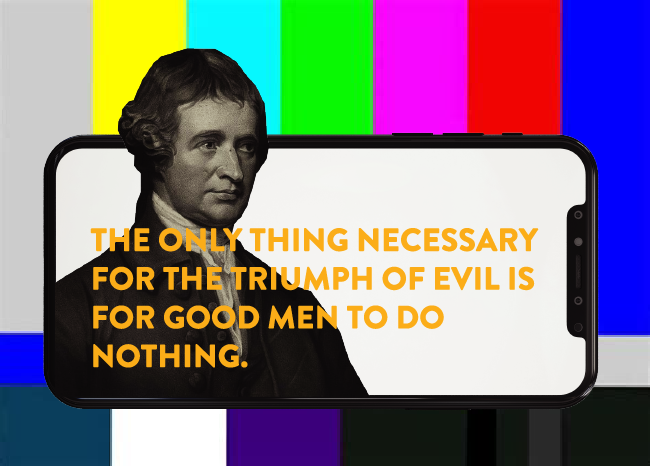
*Sigh*. Sure.
At least Google is evil as any corporation of an uncertain size must surely be, by virtue of the social power and material resources it commands. No honest corporate list of “values” or mission statement is being honest if it starts with anything other than:
- At all costs, [the organization] will seek to preserve its own existence.
Even if you don’t like the idea of corporations being people, you can’t argue with the self-preservation instinct they display and wield at the world. Nonetheless, it is pretty obvious that “Google is evil” is the kind of thing people only say or write if they have a real axe to grind, as opposed to when they have taken a measured look at the facts and objectively categorized all corporate actions using an unimpeachable moral rubric. We should be so lucky.
Why does Google suck? Because it cares more about self-preservation and profit than searcher satisfaction — corporate messaging notwithstanding.
That’s hardly a criticism unique to Google. There are, however, plenty of ways Google is uniquely problematic, harmful, or disruptive in the un-sexy sense of disrupting life, commerce, and individual human happiness.
Google Is Bad for Smaller Websites!
Yes. Pretty clearly, Google is often a serious drag on smaller websites — and they are all smaller websites.
If you make money from ads, affiliates, or other mechanisms that depend on traffic and visibility, Google has almost certainly made life worse by making it harder to get visitors through search. If your traffic formerly came entirely from curious searchers, with no inbound visitors from social media, direct navigation, referrals, or other means, then
Google may even have made your site irrelevant.
Your site’s burial could result from SERP features like Knowledge Panels and Rich Snippets. These offer zero-click information and answers, and they stop visitors from ever having to leave Google’s SERP to get what they want. And as Google embraces generative AI (lest it get left behind by others like ChatGPT), the zero-click search faces further entrenchment in our web experience. Essentially, if your site prides itself on answering “yes” or “no” questions, or anything that can be addressed in a simple paragraph, Google’s chatbots are coming for your content and your visibility.
This impact is also pretty hard to argue. Google makes content visible, but that doesn’t always involve sending traffic. Plenty of critics say this amounts to robbing non-Google content of revenue. Or even outright stealing money from smaller, especially local outlets for news and other specialized content that is difficult and costly to produce. This has even been the basis for some international boycotts, threats, lawsuits, and negotiations.
Google Is Censoring Search Results!
Kinda. But not really in the way rabid critics would like to argue.
No in the tin-foil-hat sense. There is no evidence that censorship by Google actively and thoughtfully follows a clear, consistent agenda in the SERPs by silencing dissenting voices or erasing conflict, bias, nuance, or other uncomfortable facts, stories, or results. It may not be as air-tight an echo chamber as Facebook, but you can still feed your confirmation bias through Google search.
Yes in the sense that Google does actively, and publicly, engage in selectively not displaying the most relevant results when those results would be likely to cause direct harm. This is called, for simplicity, Your Money, Your Life (YMYL) content. Why is Google “censoring” your search results? So bad actors have a harder time taking advantage of you, pointing you in the wrong direction, or otherwise harming you where you are most vulnerable.
Google Censorship
So, what exactly does censorship by Google look like? Firstly, it isn’t censorship the way you might imagine. The information is still usually out there, for one thing — Google just doesn’t lead with the actual best match for problematic or dangerous queries.
Googling “how to kill yourself” will yield harmless resources like your region’s suicide prevention hotline. That is obviously and deliberately the opposite of what the searcher is asking for, but legally and morally hard to indict.
Likewise, if you try to Google symptoms for a DIY medical diagnosis, or research cures and treatments that fall outside evidence-based best practices, you may find more research and clinical commentary critiquing and debunking questionable medicine.
The important thing to remember here is that Google — from the index to the ranking algorithm to the SERPs — has to work equally well, all the time, for any query. Despite the fact that something approaching 15% of all searches on a given day have never been seen by Google before.
If you’ve ever been caught in a lie, you know how hard it can be to remain logically and factually consistent while hiding or changing a truth. If you think Google can do this willfully at the scale of the World Wide Web, you probably also believe that Google is a singularity, and not a constantly rotating consortium of engineers, programmers, data scientists, and regular corporate drones just plugging away at ordinary desk jobs.
Is Google Dying?
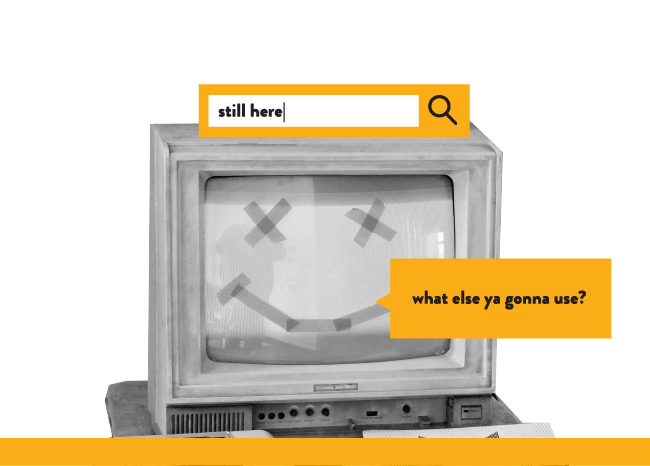
No. Google isn’t dying. At least, no more than the rest of us die a little every day.
Google is so big, so popular, and so ubiquitous in online search, that it has a long way to go to be realistically facing an existential threat. But Google isn’t bulletproof.
Will AI Search Replace Google?
No. AI will not replace Google search. If the generative AI craze proves durable and popular, Google will integrate it into its search ecosystem, but that’s just another step in Google’s long evolution as a search engine.
Google is struggling to maintain credibility as the world’s most popular search engine, and it has failed dramatically in its early efforts to get in front of the generative AI/generative search trend. That’s a very visible stumble for Google, but again, not fatal in the foreseeable future.
Realistically, search is too multifaceted and has too diverse a user base for a single tool or innovation to completely take over. For instance, as long as people are interested in reviewing sources, there will be a place for the more traditional list SERP. Not many people care enough to look behind the generative AI curtain, as it were, but enough do that they stand ready to call out efforts to offer answers without evidence or sources.
Likewise, generative AI is getting good at manufacturing (faking) its own images and video, but an all-new, AI-generated video or image is no substitute for a media search engine. Ditto for news and shopping. Generative AI is a great assistant, but a poor replacement for web search engines. Google stumbled off the blocks when GPT took off running, but that starting advantage is all but gone, and the market is far from settled.
Replacing Google Is Difficult (But Not Impossible)
The market is a big place: the success that is mind-blowing for each of the small players is barely a rounding error for the giants, and Google is by every measure a giant.
Any would-be alternative or competitor very quickly faces the same challenges — and by extension, the same criticisms — as Google search. Namely:
- Scale: How do you set up and maintain all the data storage needed to archive the entire web, regularly?
- Support: How do you recruit, staff, and retain talent for all the technical support, ongoing updates, feedback solicitation, user engagement, and other iterative processes for keeping search engines relevant?
- Intelligence: How do you make sense of searcher intent? Or more to the point: how do you teach an automated, worldwide system to quickly, accurately, and responsively read between the lines (and the broken grammar, spelling, and general inarticulateness of all of humanity) to give them what they are trying to ask for?
- Global Accessibility: How do you adequately support different languages, regions, and mobile locations? For that matter, how do you provide a quality experience across different devices and browsers?
- Multimedia Support: Even if you can intelligently handle the sheer amount of text content online, how do you produce results for different media like images, video, social, and so on?
- Consistency: How do you convince all the site managers and content creators across the World Wide Web to employ the standards that will allow them to accommodate your new search engine, in the hopes of being discovered through your service?
- Profitability: How do you make money? Or, if the goal is to simply remain free and ownerless, how do you ensure you get enough donations and material support?
The last is the stickiest wicket to clear, and a pain point for virtually every upstart search engine on the market.
Google still doesn’t face serious threats of replacement — at most, emerging alternatives can hope to displace Google’s preeminence, in much the same way craft beer companies are clawing incrementally at the market share of AB InBev and Molson Coors. (Over the last decade, craft beer’s market share has more than doubled! Specifically, from just over 10% to just shy of 25%. It only took nearly 10,000 small businesses and 10 years to chip away a 15% share of the market. Is Big Beer dying? You tell me.)

